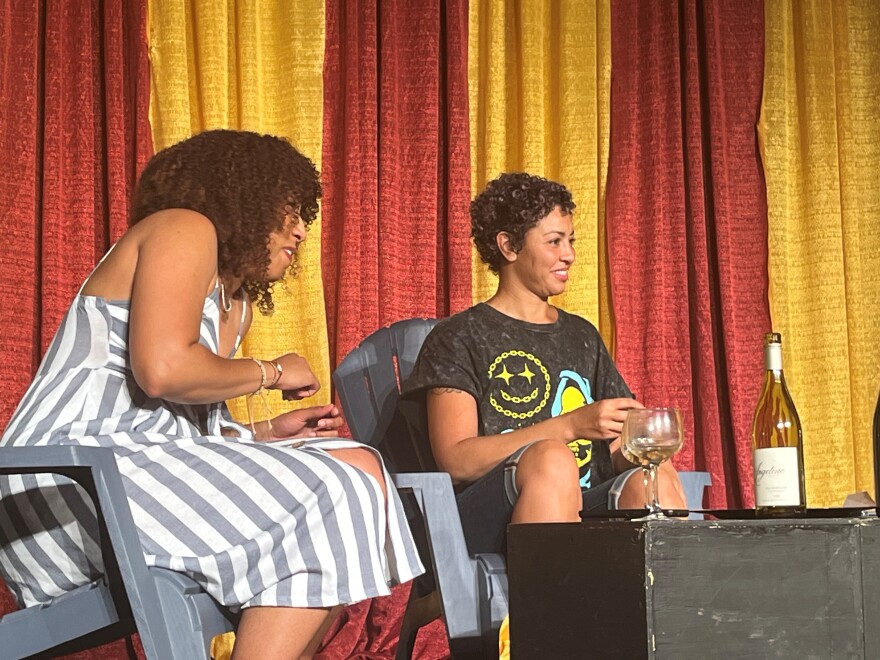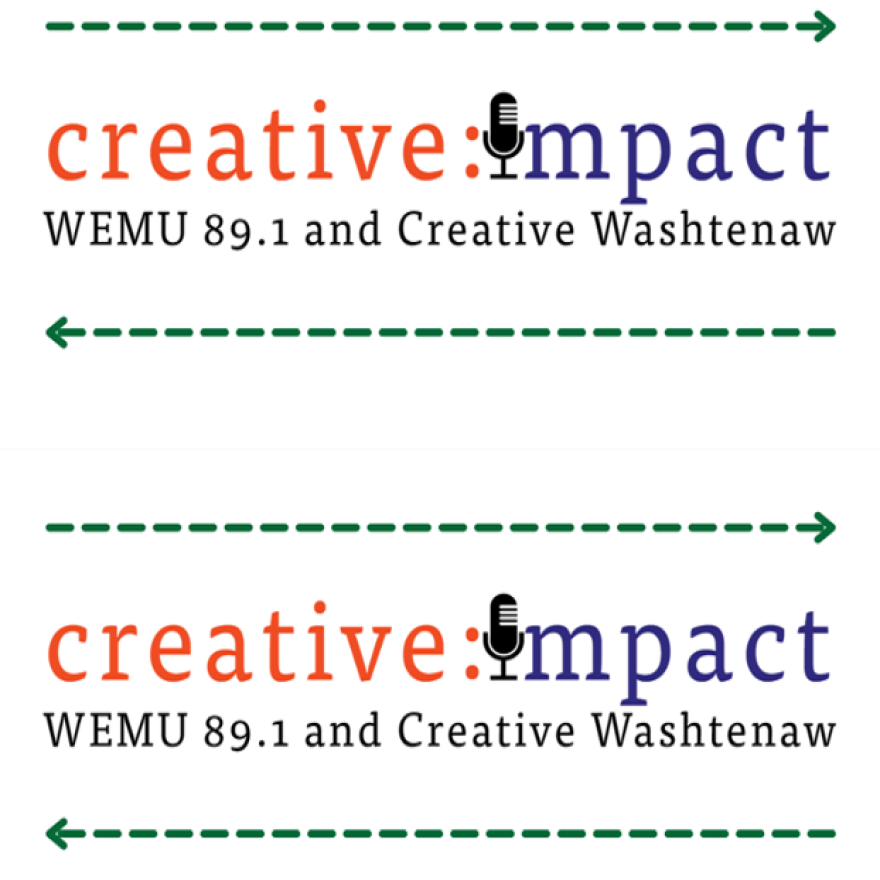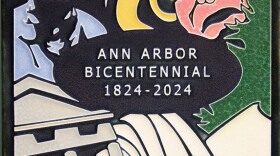Creative industries in Washtenaw County add hundreds of millions of dollars to the local economy. In the weeks and months to come, host Deb Polich, the President and CEO of Creative Washtenaw, explores the myriad of contributors that make up the creative sector in Washtenaw County.

ABOUT RACHEL KEOWN:

Rachel is a 2008 graduate of UNC School of the Arts and is a director and playwright. In 2019, she was selected to attend the Mitten Lab playwriting workshop (Bear Lake, MI) as a playwright in residence — facilitated by Rachel Sussman (Producer of “Suffs,” “What the Constitution Means to Me;” Katherine Carter (Director, Canadian Grand Opera, Houston Grand Opera) — and was afforded the opportunity to develop her first full-length play, BOX CUTTER, that culminated in a performance at Interlochen.
A second full-length play, THANK YOU, BUT F**K YOU was completed, and partially workshopped over Zoom with L.A.’s Inkwell Theatre in 2020, the same year two of her short plays, DUTCH BABY and BOOK’D premiered virtually at Theatre Nova’s virtual festival (New Plays, New Voices) in Ann Arbor, Michigan. BOOK’D recently received its first fully-staged production in Augusta, Georgia with Gather by the Ghost Light at Le Chat Noir, and was published in the anthology GBTGL Off Broad Street Short Play Festival.
Rachel’s dark comedies strive to evoke a better understanding of the various catalogs of misogyny through the female lens; her work often depicts oppressive patriarchal structures that serve to ignite the change female-identifying characters’ require to remove their lack of self-awareness, resulting in the destruction of societal toxic, misogynistic, conformity and assimilation.
In 2010, for funsies and totally not manic-induced!, she joined a Bonneville Motorcycle Racing Team and obtained an International Landspeed Record (top average speed 141 mph).
RESOURCES:
"Book'd" by Rachel Keown Burke
Autoevolution: "Rookie Female Rider Breaks Motorcycle Speed Record"
TRANSCRIPTION:
Deb Polich: This is 89 one WEMU's creative:impact, our weekly showcase of the artists and creatives who make our community one of Michigan's most vibrant cultural destinations. I'm Deb Polich, president and CEO of Creative Washtenaw and your host. So, if "all the world's a stage," as William Shakespeare wrote in "As You Like It," does that make us all playwrights? Chelsea playwright Rachel Keown probably has an opinion. Rachel, welcome to creative:impact!
Rachel Keown: Hi! Thank you for having me on here!
Deb Polich: And we're so happy you are! So, your credentials include graduating from the University of North Carolina School of the Arts, stints as a cinematographer, camera operator, actor, in addition to a few other things like breaking the speed record for a 1000cc motorcycle at the Bonneville Salt Flats. What????
Rachel Keown: Yeah!
Deb Polich: But you define yourself, though, as a director and playwright. And so, how did writing and directing become your thing?
Rachel Keown: Well, after I had started out in theater, actually in 1999, when I was about 16 years old, my brother had gotten me into theater. He graciously allowed me into his circle when he was going to school--when he was in college. And I tagged along as his little sister and started. And my first play there was as a sheep puppeteer.
Deb Polich: Nice!
Rachel Keown: Yeah. So, that sparked my interest in doing that. And by the time I got to 18 years old, I was ready to go to film school then. And like you said, I had gone into cinematography at the University of North Carolina School of the Arts and had taken a little bit of a break from theater. But when I came back, actually, I moved back to Michigan in 2012, and that's when I began participating in theater again as an actor and a director and got to participate in my first professional theater with Planet Ant.
Deb Polich: Okay.
Rachel Keown: Actually, for their Debuck's Fest in Detroit. And that's when I begin writing again.

Deb Polich: So, there really are a lot of tough routes to take in pursuit of a creative career. Playwriting has to be one of the most challenging. And not so much because of the creative process, writing requires imagination and skills, but tools needed to write are pretty readily available, whether it's pencil and paper or computer. Bringing something from the printed page to life, getting a play produced and seen, and then whether or not any money is made, this is actually a rather complicated process. One might ask. In fact, I will ask you with great respect for your craft. Why bother?
Rachel Keown: Oh, that is a really good question. I think, for me, when I began writing, money was not at the forefront.
Deb Polich: Okay.
Rachel Keown: Yeah. It couldn't have been at the forefront because it's just something that you can't take into consideration, like I couldn't take into consideration. I suppose if you want to go into that business, maybe you should move out of California, where the big money is. Saying that I want to see in people reading my work, I guess that's where I would want to begin. Because when you write a play, it's meant to be heard in maybe a small group, so you can go back and work on it, and then you write it, and then you listen to people say the words again, and then you go back and write it--rewrite it. And writing is rewriting. And maybe you never get to see it on the stage. So, the thought of making money off of that at the beginning, unfortunately, that just doesn't always cross my mind.
Deb Polich: It's got to a labor of love, right?
Rachel Keown: It really does.

Deb Polich: A labor of love. But you're doing it, right?
Rachel Keown: Yeah.
Deb Polich: I mean, you've had some of your plays, including "Box Cutter," "Dutch Baby" produced or workshopped. And just a few months ago, "Book'd," your short play that premiered in 2020 at Ann Arbor's Theater Nova was produced in Georgia. And so, you've had that experience of your characters coming to life on the stage.
Rachel Keown: Yeah.
Rachel Keown: Does it turn out the way you imagined it in your mind?
Rachel Keown: Well, yes and no. When I create a character, I can hear it as much as I want in my head. But, yeah, I can play God as much as I want. But as soon as you hand it off to somebody else, it's theirs. And that's the most exciting thing is it's no longer yours. And you get to see every iteration that the director and the actors bring to life. When it was done with the actors at Theater Nova, of course, they performed it over Zoom.
Deb Polich: Oh, yeah. Sure.
Rachel Keown: So, yeah. So, what I had to do was I had originally written for, they were going to perform it on stage for the festival. And of course, the pandemic happened. So, I rewrote everything to perform it as if it were almost on TV.
Deb Polich: Okay.
Rachel Keown: And so, it became this brand new animal. And it was exciting to see what the actors were able to do with that. Now, when it went to Georgia, I had this whole space of time between 2020 and 2024 to work on it---to rework on it. I hadn't picked it up until 2023 to transform it back to on-stage.
Deb Polich: 89 one WEMU's creative:impact continues. My guest is Chelsea playwright and director Rachel Keown. Rachel, when a show is being put on the stage, are you involved at all with the development of the production? Are you talking to the director? Are you giving character information to the actors, or are you completely away from it?

Rachel Keown: A lot of times, playwrights do get to be involved with working with the directors and the creative team. In the case when I went to Augusta to watch the play, I talked to the director a couple of times, and he was letting me know what was going on with the actors and some interesting things that he was able to do with one of the effects with a backpack and a book had to catch on fire. And I was maybe concerned--or not so much concerned, but curious--as to anyone, any director, would ever try to emulate smoke or anything like that. And he was really excited. One day, he messaged me and he said, "Guess what? I got a smoke machine. We're going to be able to make it look like the backpack is on fire!" And I'm like, "That's great! That's fantastic!" And then, he was like, "It failed in rehearsals! But we're going to try!" I'm like, "Well, that's great that you're going to try!" So, that's the communication that we had. But, for my purposes, I think it was just great that I was able to just show up, watch the show, and just appreciate everything that the director and the actors and everyone did to--
Deb Polich: To bring it together.
Rachel Keown: Yeah. To pull out of my head what I attempted to...
Deb Polich: On the stage?
Rachel Keown: Put on paper!
Deb Polich: Right, right. That's got to be a great experience. So, I mentioned earlier that affording a career as a playwright is a challenge. You recently received a grant that Creative Washtenaw administered on behalf of the Ann Arbor Area Community Foundation. First of all, congratulations on your award! You know, grant writing itself is a challenge, and the odds of earning a grant might be less than getting a play produced. Who knows? Still, it's necessary--a reality of the work creatives do. Besides the financial support, are there other benefits to receiving a grant?

Rachel Keown: Yes, there is! It's absolutely something that I can put on. A playwright isn't actually really different than any kind of resumé that you would create for any other job. You want to show that you have had readings on your resume and that you have had performances and that also you want to show that you have had residencies, like I've gone to Mitten Lab. And something that you can put on there that's actually really important is that you have gotten grants for the work that you've done, because it shows that you are able to express your artistic statement and letters of intent and your commitment and your devotion to your art.
Deb Polich: Right.
Rachel Keown: Absolutely! Being able to obtain grant shows your interest and your dedication to your art. And that is more than just obtaining money to support your art. Absolutely!
Deb Polich: Real quickly. Anything in the works right now?
Rachel Keown: Yes. People are going to be able to see "Book'd" at the Rosedale Community Players September 13th through the 15th. It's a one-act festival. There's going to be eight plays there. Roseville--or Rosedale, sorry--Community players is in Southfield. I understand that you can also bring your own food and any beverages to create your own experience. So, that should be a lot of fun. It's a great, great community.

Deb Polich: Right. And we'll have that information as well. But, hey! Thanks so much for joining us on the show. You're clearly a woman of many talents, and we look forward to seeing your work as it's produced and the next things you have in line.
Rachel Keown: Thank you so much! Thank you for having me on here! I appreciate it very much!
Deb Polich: For sure! That's Rachel Keown, Chelsea playwright and director. Find out more about Rachel and find her "Book'd" script at wemu.org. You've been listening to creative:impact. I'm Deb Polich, president and CEO of Creative Washtenaw and your host. Mat Hopson is our producer. Please join us every Tuesday to meet the people who make Washtenaw creative. This is 89 one WEMU Ypsilanti. Public radio from Eastern Michigan University.

If you'd like to a guest on creative:impact, email Deb Polich at <i>deb.polich@creativewashtenaw.org</i>.
Non-commercial, fact based reporting is made possible by your financial support. <b>Make your donation to WEMU today </b>to keep your community NPR station thriving.
Like 89.1 WEMU on <b>Facebook</b> and follow us on <b>Twitter</b>
Contact WEMU News at <i>734.487.3363</i> or email us at <i>studio@wemu.org</i>







